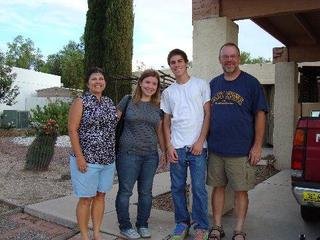A new liturgical year begins this coming Sunday, November 29, 2009, with the First Sunday of Advent. The Season of Advent consists of the four Sundays before Christmas. The liturgical color for Advent is purple or sometimes blue. We will begin a new liturgical cycle of seasons, feasts and fasts, and scripture lessons. This year the gospel will focus on the Gospel according to Luke with The Gospel according to John interspersed throughout the year but primarily in the Easter season.
The liturgical cycle is not, however, simply about passing time. The liturgical cycle tells the story of God’s life in the world. But it is more than just reciting the story. We are participants in the story not simply spectators or listeners. It is a ritual re-living of the life of Christ. Liturgy is the means by which we tell, live, and experience the story. It becomes real. It becomes our story not in the sense that we own it but in the sense that the liturgical cycle tells the story of our lives.
It has been said that liturgy is humanity’s yearning for God and grace is God’s yearning for humanity. Liturgically, this story of holy yearning—God’s and ours—begins in Advent. Advent means coming or to come. Advent is really about two comings. It is waiting and watching for the coming of the Christ child—new life, new birth, new hope coming into our world and our lives. It is the fulfillment of God’s promises. It is also waiting and watching for the coming of the eschaton—the end times when the fullness of God’s kingdom will be present. These are both future events and at the same time a present reality. They are already and not yet. Both of these advents are about the coming together of humanity and divinity.
The four Sundays of Advent are too often seen as the countdown to Christmas, as the time when we get things ready for Christmas. Santa Clause has been out since well before Halloween. Shopping lists are growing and the number of shopping days is shrinking. Menus are being planned. Travel is being arranged. Families are gathering. Expectations and hopes are growing. The countdown is well underway. Trees need decorating and presents need wrapping. Somewhere in all that is the stuff of everyday life – work, school, car pool, sports, paying bills, and running errands. There is so much to do and time is running out. The temptation is to live a “hurry-up, get busy, Christmas is almost here,” Advent. That is not the liturgical understanding of Advent. That kind of Advent can only lead to a “hurry-up, get to church, open the presents, take down the tree, Christmas is over,” Christmas.
The four Sundays of Advent are not the time when we prepare for Christmas but the time in which we are being prepared for Christmas. Advent is a time when the Church stands up in the face of the busyness of life, shopping, parties, cooking, traveling, and decorating and asks us to slow down, be still, and be quiet. We are to keep awake, looking and listening for the God who is always coming to us. We are called to prepare the way of the Lord. We watch and reflect on who we are. We look for the Christ in all the unexpected places – in the stuff of everyday life, in the poor, the hungry, and the needy. We live with expectancy and anticipation of God’s presence in our lives. We wait for the angelic messenger that promises us that the womb of our humanity will bear a child named Jesus.
That is hard work any time but especially in one of the busiest times of the year which may just mean it is even more necessary. Advent reminds us that waiting and watching are holy work. So how do we do this? Silence is the key. Silence is a way of waiting, a way of watching, and a way of listening to what is going on within and around us. We come to self-knowledge through stillness and silence, through attentiveness and watchfulness.
The desert mothers and fathers knew well the practice of waiting and watching. Abba Arsenius said he heard a voice say, “Arsenius, flee; be silent, pray always.” And Abba Poeman said, “Be watchful inwardly; and be watchful outwardly.” These practices are not just for the ancient desert dwellers. Living as we do in a culture of excessive distraction, noise, busyness, comfort, and instant gratification the wisdom of the desert should not be ignored.
So I wonder what we would discover if for the Season of Advent we took five minutes, ten minutes, thirty minutes even an hour each day to just sit in silence and stillness waiting and watching. What would the Coming One show us, say to us?

No comments:
Post a Comment